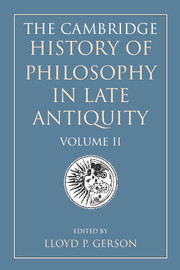Book contents
- Frontmatter
- VI Late Platonism
- VII The third encounter of Christianity with ancient Greek philosophy
- VIII Philosophy in transition
- Introduction to Part VIII
- 46 Early Byzantine philosophy
- 47 The origins of Islamic philosophy
- 48 Ancient philosophy becomes medieval philosophy
- Appendix: List of works of ancient authors
- List of abbreviations
- Bibliography
- Index locorum
- General index
- References
48 - Ancient philosophy becomes medieval philosophy
from VIII - Philosophy in transition
Published online by Cambridge University Press: 28 May 2011
- Frontmatter
- VI Late Platonism
- VII The third encounter of Christianity with ancient Greek philosophy
- VIII Philosophy in transition
- Introduction to Part VIII
- 46 Early Byzantine philosophy
- 47 The origins of Islamic philosophy
- 48 Ancient philosophy becomes medieval philosophy
- Appendix: List of works of ancient authors
- List of abbreviations
- Bibliography
- Index locorum
- General index
- References
Summary
Any attempt to describe and understand the transition between ancient and medieval philosophy is immediately confronted by the enormous quantity of writings to be evaluated and by the complexity of their interrelations. In the face of such a challenge, certain methodological premisses guiding the selection of authors, texts and themes must be established, even if that selection can only be fully justified at the conclusion of the project. The analysis to be undertaken here will employ the following explicit criteria.
First, the authors of the texts transmitted and their privileged themes will be used as the basis for investigating the readers of the transmitted texts and their privileged themes rather than the reverse. To provide some concrete examples, we will employ the ancient writer Calcidius’ presentation of the three principles of Platonism as a starting-point for the discussion of Hugh of St Victor’s medieval treatment of the same topic, or the ancient writer Boethius’ definitions of nature as a starting-point for Iohannes Scottus Eriugena’s treatment of the same issue during the ninth century, or again the ancient writer Proclus’ placing of the One beyond Being as a starting-point for Berthold of Moosburg’s medieval treatment of the same question. Discussion of the actual medieval context of such philosophical questions in a systematic or chronological manner will not be our primary concern.
- Type
- Chapter
- Information
- The Cambridge History of Philosophy in Late Antiquity , pp. 894 - 914Publisher: Cambridge University PressPrint publication year: 2000



